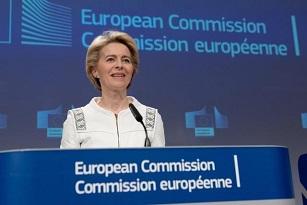
Today the von der Leyen Commission revealed its working methods which will be the basis for the new College to deliver on the President's Agenda for Europe during the next five years. They put collegiality, transparency and efficiency first.
The Working Methods introduce a number of novelties to the way the Commission works, notably with regards to the role of the Executive Vice-Presidents, the High Representative/Vice-President, the Vice-Presidents and Commissioners' Groups. They also set up a new body for coordinating external relations questions, the Group for External Coordination (EXCO) and define how the Commission will follow up on its pledge to act on European Parliament Resolutions based on Article 225 of the Treaty on the Functioning of the European Union (TFEU). Finally, the Working Methods also pave the way for the digital transformation of the Commission, whereby meetings shall become paperless.
The main guiding principles when working together
Today the von der Leyen Commission revealed its working methods which will be the basis for the new College to deliver on the President's Agenda for Europe during the next five years. They put collegiality, transparency and efficiency first.
The Working Methods introduce a number of novelties to the way the Commission works, notably with regards to the role of the Executive Vice-Presidents, the High Representative/Vice-President, the Vice-Presidents and Commissioners' Groups. They also set up a new body for coordinating external relations questions, the Group for External Coordination (EXCO) and define how the Commission will follow up on its pledge to act on European Parliament Resolutions based on Article 225 of the Treaty on the Functioning of the European Union (TFEU). Finally, the Working Methods also pave the way for the digital transformation of the Commission, whereby meetings shall become paperless.
The main guiding principles when working together
The European Commission takes decisions collectively. All Members of the Commission are equal when making decisions and equally accountable for these decisions. Once decisions are taken, every Member of the Commission must take ownership of them, promote and defend them. Three Executive Vice-Presidents have a dual function, acting both as Vice-Presidents and managing a policy area. The Executive Vice-Presidents, the High-Representative/Vice-President and Vice-Presidents are in charge of political steering and coordinating the work in their area of responsibility, notably though so-called ‘Commissioners' Groups'. President von der Leyen has established six Commissioners' Groups covering the six Political Priorities: a European Green Deal; a Europe Fit for the digital age; an Economy that works for all; Promoting our European Way of Life; a Stronger Europe in the world and a New Push for Democracy.
Transparency should characterise the work of all the Members of the Commission and of their Cabinets. All Members of the Commission will make public all meetings and contacts relating to EU policies and decision-making.
A geopolitical Commission
For the first time, a specific group will be in charge of coordinating external affairs aspects of the Commission's work. Preparing the College meetings, the new Group for External Coordination (EXCO) will discuss on a weekly basis current international issues and coordinate positions to be taken in international fora or during Summits, amongst other things. The Group will be central in aligning the internal and external dimensions of the Commissions' work.
Committed to a Democratic Union
To demonstrate the importance the European Commission attaches to what citizens and their directly elected representatives in the European Parliament say, the College will discuss in their meetings every decision relating to whether or not to register proposed European Citizens' Initiatives. It will also discuss and adopt decisions concerning European Parliament resolutions and Council requests on legislative initiatives under Articles 225 and 241 TFEU –in full respect of the proportionality, subsidiarity and better law-making principles. The Vice-President for Interinstitutional Relations and Foresight, Maroš Šefčovič, will inform the European Parliament on the follow-up proposed within three months of the adoption of the relevant resolution.
In line with their mission letters, Members of the College shall visit every Member State within the first half of the Commission's mandate at the latest. They are expected to meet regularly with national Parliaments and take part in Citizens' Dialogues across the Union, notably as part of the Conference on the Future of Europe.
Cutting red tape
The College will apply the “one in, one out” principle whereby each legislative proposal creating new burdens should relieve people and business of an equivalent existing burden at EU level in the same policy area. The Vice-President for Interinstitutional Relations and Foresight will oversee the application of the principle and ensure that it is applied coherently across the Commission services.
A digital Commission
The European Commission strives to become a digitally transformed, user-focused and data-driven administration. The College will lead by example by holding paperless meetings supported by an e-College tool. The aim is to gradually introduce paperless meetings at all levels of the organisation. This will be done in full respect of data protection and security requirements.
A greener Commission
The Commission will step up its efforts to improve the environmental impact of its activities in the area of energy, water and paper consumption, waste management, and CO2 emissions. It will do so through new initiatives in the framework of its Environmental Management System, an improved implementation of circular economy principles in green public procurement and strengthening staff's ability to adopt ecological behaviour.
Background
Details
- Publication date
- 4 December 2019
- Author
- Directorate-General for Neighbourhood and Enlargement Negotiations
